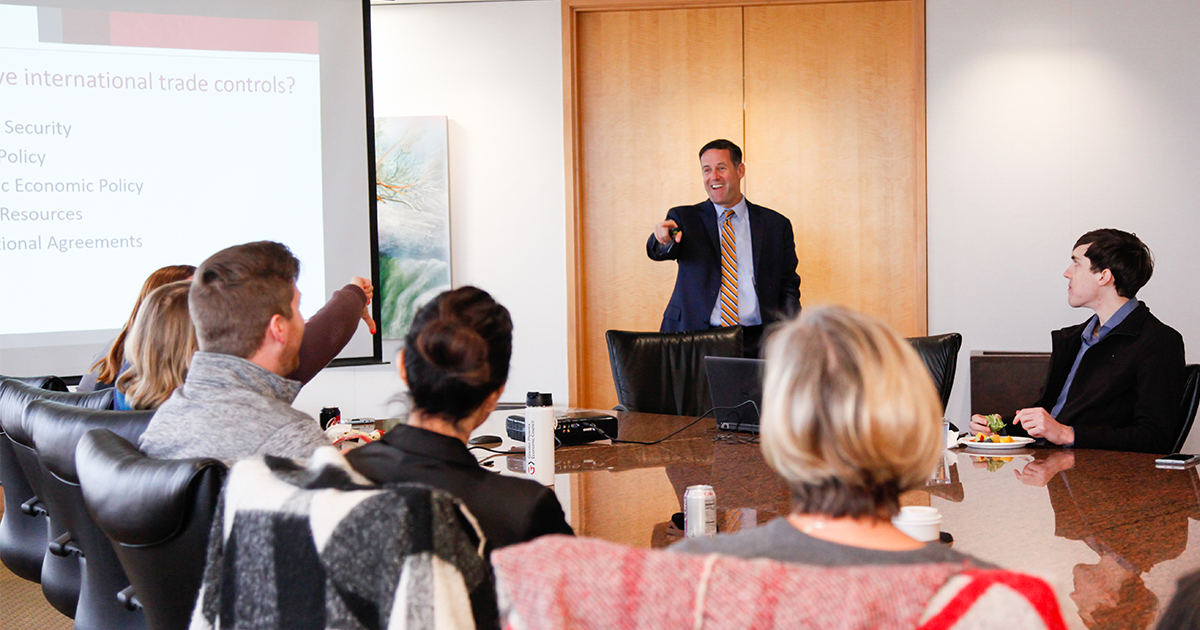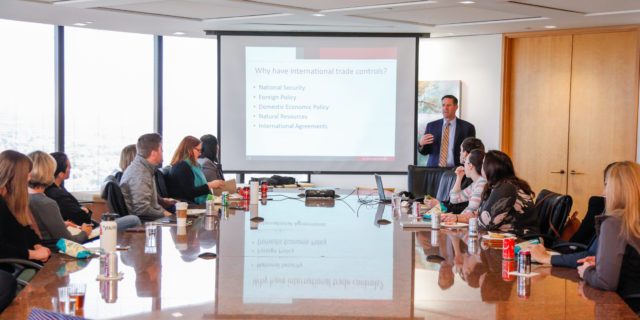

Fireside Chat: Prepared to be international
Published: 02/18/2020
Updated: 09/12/2024
Part of the scalability equation for any company is determining a go-to-market strategy to enter the international market. After all, 96 percent of the world’s consumers live outside of the United States according to the U.S. Small Business Administration. Mexico alone purchased $256 billion worth of goods from the U.S. in 2019, doubling from the decade before. Our staff recently spent time with Greater Phoenix Economic Council (GPEC) board member Brett Johnson, a partner at Snell & Wilmer, discussing his expertise in international trade laws and regulations.
To say that international customer bases and business regulations are confusing is an understatement. It takes teams of experts to understand the best place for expansion and how to set up the best system to achieve the most success and profit out of your investment. Even when you think you have it all figured out, the rules can be changed due to an unforeseen political or economic reason. However, even with the risk involved, companies shouldn’t shy away from expanding internationally. Just like any calculated risk—it requires a clear plan.
That’s where we come in. We provide companies moving into the Greater Phoenix market with every advantage available. This includes a network of leaders with extensive knowledge of international trade best practices and regulatory red flags. Here are the most interesting and important strategies that came out of our discussion with Johnson.
Strategy #1: Understand that governments view your business venture differently
Remember that you and the governments of the world have different goals and priorities—and that’s OK! The reality is that both parties have different goals they are trying to accomplish. Johnson gave the example of a brewer. As an expert at crafting beer, they are an authority of every step in the process. Every piece of equipment is natural and familiar to you, making it easy to understand. You see everything in the context of brewing. The government doesn’t necessarily see it the same way. The government’s interests are not in how to brew beer, but rather, the security of the nation. The disconnect between the brewer’s intention and the government’s objective is important to understand so you can best navigate the regulations the alphabet soup of government agencies require. The same concept applies to your business. You are an expert in your craft, you understand the technologies and skills needed to create better than anyone else. To understand what they require, you must appreciate what the government is worried about.
For example, the U.S. government creates regulations to preserve one of five national assets: national security, foreign policy, natural resources, international agreements or domestic economic policy. In the news, policies might be put in the context of any one of these governmental goals. In today’s market, the number one asset to protect is the domestic economy. ‘”How does allowing other nations to purchase this product affect our economic edge?” is the question officials ask about every exported product. When both political enemies and allies obtain a product, that can effect our global economic edge by leading to trade disagreements, even with traditional allies.
Rarely a company has a complete understanding of how its product is classified by the U.S. and foreign governments. Examples of these products can include physical products as well as products that are services, like expertise and Software-as-a-Service (SaaS), which are regulated and subject to the same process.
Every importing and exporting company should know the import regulations on their classification and which of the 22 federal agencies controls the import and export of the product. Moving a business from the domestic market to the international market adds national concerns to the business plan.
Strategy #2: Know the competitive edge one location gives over another
Government regulations limit the number of opportunities available in the international shipping market. Give yourself every edge on the competition by taking advantage of the limited opportunities that exist.
For example, SkyBridge Arizona, the nation’s first international air cargo hub to house Mexican and U.S. customs, allows goods to be precleared here in Greater Phoenix and skip the customs process in Mexico. Goods are able to travel the same day anywhere in Mexico directly via air freight. Situations such as these are easy ways to help get on the ground faster and start making a profit. There are benefits from locating your business on a site that provides processing advantages and local experts on international trade. Mexico is becoming the United State’s number one trade partner. With over $600 million in trade in 2019, Greater Phoenix’s extensive trade experience with Mexico has become even more dominant. If trade with Mexico is important to a company, Greater Phoenix is the best location to take advantage of new opportunities.
This expanded relationship is changing how goods are moved between Mexico and Asia as well. Helping to open China, Japan and South Korea; the third, fourth, and sixth largest U.S. trade partners; to expand re-export opportunities with Greater Phoenix is no small task. The good news is this growing opportunity isn’t stopping any time soon. SkyBridge Arizona has expansion plans for 350 plus acres of land over the next 10 years. Taking advantage of SkyBridge’s opportunities will give any Arizona-based company opportunities that other locations can’t.
Strategy #3: Develop systems to catch and solve mistakes
The bottom line is international trade is complicated and mistakes will be made. To encourage U.S. companies to engage in international trade and incentivize them to be as transparent as possible, the U.S. government has made a standard practice to cut fines in half if an error is self-reported. There are a large number of examples in 2019 where declinations were given. For the U.S., it’s better to catch and admit a mistake than to ignore it and get caught.
The Office of Foreign Assets Control (OFAC) has given a set of guidelines to make sure that companies are working to avoid errors and omissions. This set of guidelines requires companies to engage in six actions to be in compliance:
- Upper management involvement in all undertakings
- Regular risk assessments are taken or completing C-TPAT certification
- Internal controls to catch foul play and errors
- Regular audits where actual situations are scrutinized
- Regular employee training
- The obstruction of transactions that work around sanctions
All of these standards demonstrate the importance of catching, reporting and fixing mistakes. This is easier said than done, but can be accomplished if you start early with a system in place.
International trade is an exciting and potentially profitable venture, but it can often require a team of experts to pull it off successfully and with the government’s blessing. If you are an innovator or entrepreneur that is ready to expand onto the world stage, find out how GPEC can be part of your expert team here. If you are ready to talk to an expert about your goals engage with us.
Want to share your growth and success with the community?

